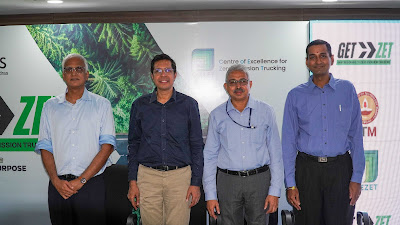Indian Institute of Technology Madras (IIT Madras) has launched major initiatives towards India achieving its 100% Zero Emission Truck penetration by the year 2050.
The objective is to accelerate adoption of Zero Emission Trucks (ZET) like Electric Trucks in India as despite trucks representing only 5% of the vehicle fleet, they consume nearly 65% of diesel, leading to substantial pollution and fuel consumption costs.
The Centre of Excellence for Zero Emission Trucking (CoEZET) at IIT Madras launched two major projects during ‘Get ZET – Shifting Gears to Zero Emission Trucking’ held at IIT Madras Research Park today (9th Dec 2024). They include:
Addressing the event, Prof. V. Kamakoti, Director, IIT Madras, said, “Awareness, Acceptance and Adoption - that is the process being taken. This first step is to make these stakeholders aware of the different aspects of truck electrification - the trends, advantages, challenges and technologies. The idea is to build a strong relationship based on trust. Once that relationship is in place, we plan to engage with them in order to help them accept the electrification journey - appreciating the benefits that accrue to them as well as the country and world at large.”
Prof. V. Kamakoti added, “Finally, we will help them adopt truck electrification with the right tools, training and preparations. There are many people who are working with different Stakeholders for Truck Electrification - IITM is engaging with this mostly neglected community that is going to be most critical in the Adoption of e-Trucks.”
India's trucking industry is on a fast growth trajectory with freight movement making up 70% of road-based transportation. Such initiatives, launched early and with prolonged engagement, is expected to help India accelerate the Electrification of Trucks, thereby saving import costs of petroleum, improving competitiveness, reducing emissions and increasing driver comfort and well-being.
Highlighting the imperative for such initiatives to drive Zero Emission Trucking, Prof. C. S. Shankar Ram, Head, Department of Engineering Design, IIT Madras, said, “This layer of stakeholders consisting of drivers, cleaners, operators, mechanics, dhabha owners, masseurs, barbers and pump operators, among others, widely called the ‘User Layer’, will be the most critical layer from a psychological acceptance perspective.”
Prof. C. S. Shankar Ram added, “While most of the other Stakeholders like fleets, Government, etc., will be influenced by the main monetary, policy, emission and energy security considerations, this layer actually feels the direct impact of any change in Trucking and, that too, on a day-to-day base. The drivers, especially, will be seeing significant improvements in their personal comfort due to truck electrification- the noise, vibration, heat, fatigue, acceleration and many other criteria will see significant improvements. But they will also be required to replan their schedules in order to find that extra couple of hours to break journey for charging. This community needs to understand and accept these changes well in advance.”
Further, Mr. T. K. Ajithkumar, CEO, Centre of Excellence for ZET added, “We will be working with this community over the next 12 to 18 months through partners. While the engagement details are conceived and designed by CoEZET, it is implemented through our partners who are skilled in the communication and technology tools required for these engagements. One of our partners will be doing hyper-local events in the dhabas, truck stops, goods exchanges and Logistics parks.”
Prof. Karthick Athmanathan, Professor of Practice, IIT Madras, added, “The User Layer is often a neglected layer and is highly informal in the Indian Trucking market. Such initiatives, launched early and with prolonged engagement, is expected to help India accelerate the Electrification of Trucks, thereby saving import costs of petroleum, improve competitiveness, reduce emissions and increase driver comfort and well-being.”


